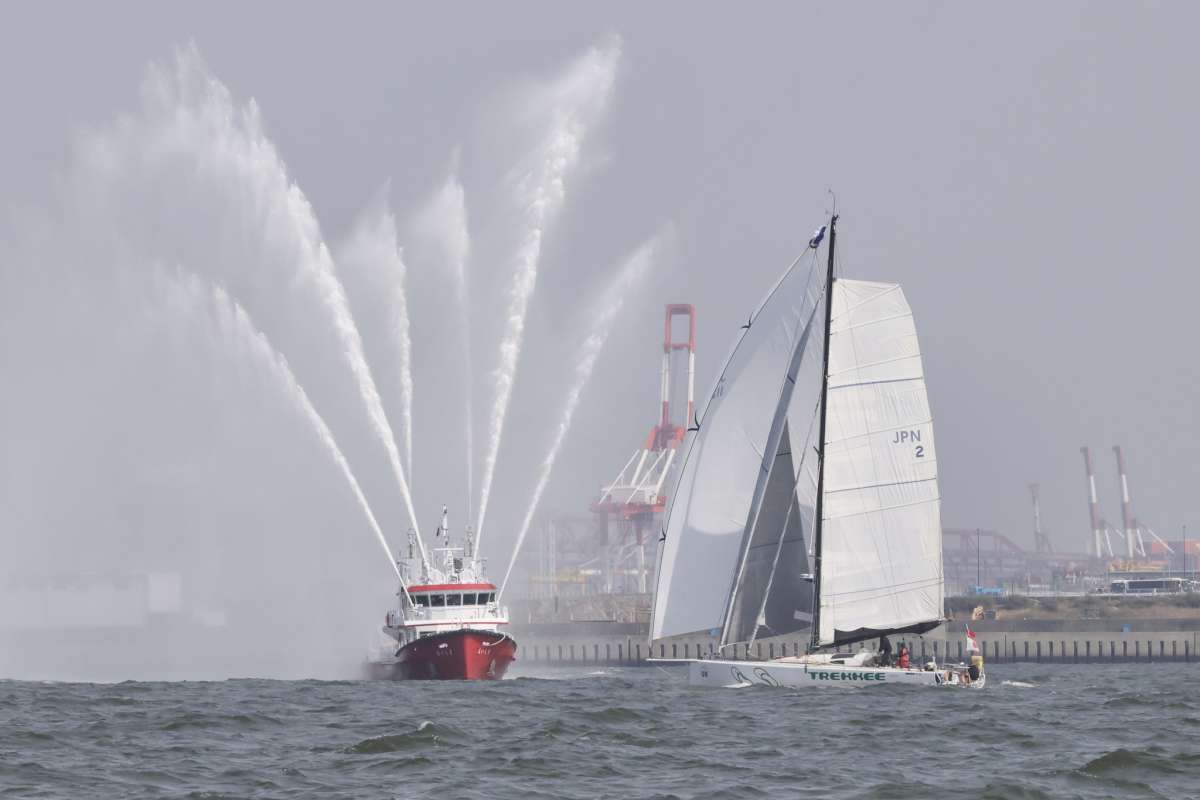A granulated sky, gusts, intermittent showers, setting sun, big Atlantic swell, squalls, breaking waves: here we have the setting for this latest departure to gain a new reference time in the Jules Verne Trophy, the round the world record held by Bruno Peyron and his crew since 2005 (50d 16h 20m). Groupama 3 left the pontoon of the port of Le Château in Brest, NW France this Thursday 5th November at 1300 hours before a warm crowd of locals and the crew's families, which came out as far as the Petit Minou lighthouse to bid them farewell. Under two-reefed mainsail and a small jib, Groupama 3 then released her tow at 1400 hours and headed out to sea in a building swell… As such the giant trimaran had to put in a few tacks to get to the North of Ushant before setting the clock running at 15h 50' 22'' UT.
A muscly introduction
The NW'ly wind associated with the low, which passed over Brittany on Wednesday, was still very active: the stormy sky with its cumulonimbus was generating a twenty to twenty-five knot breeze, gusting to over thirty-five knots… Above all though, the seas were hard at the exit from the English Channel with waves of nearly seven metres offshore! As such conditions weren't ideal for the start, but the next stage in the programme is highly favourable, once the crew reaches the Portuguese coast. As a result, for half a day, Franck Cammas and his nine crew are likely to be tackling beam winds and may even have to sail close-hauled for a few hours…
“We're going to set off under reduced sail to get free of the continental shelf. After that this NW'ly wind will shift round to the West for three hours at which point we'll have to sail close-hauled. It's not the ideal scenario for starting out, however the weather window is pretty favourable after that. In fact, from tomorrow lunchtime, Friday, Groupama 3 should already be sailing along the coast of Portugal. At that stage we'll hit some N'ly and then NE'ly winds, which are set to accompany us to the archipelago of Cape Verde” indicated Franck Cammas a few minutes after leaving the pontoon.
The crew didn't appear to be concerned about this choppy introduction to proceedings: being in a position to head out early in the season, not to have to hang around waiting for a favourable “firing window”, just after a preparation session in the mountains at the end of October, and knowing that the aim of the record is for the crew to be back before Christmas, all makes for a serene departure. “We're going to be shaken about at the exit from the English Channel because the seas are big, but that makes for a good introduction before we slip southwards. It'll be hot from this weekend, we'll be at the equator in the middle of next week and the Southern Atlantic appears to be willing to enable us a swift passage” explained Lionel Lemonchois.
As such Groupama 3 must cross the finish line off Ushant before 26th December at 08h 09' 26'' (UT)…
A tour of the weather
“Groupama 3 is setting off as the NW'ly wind is easing slightly to 25 knots with gusts at 35 knots and a reduction in the number of squalls: the storms have dissipated. Nevertheless, it is important to remain prudent as the big seas are set to last for a few more hours yet, due largely to a big NW'ly swell. The crew will have to deal with these tricky conditions right the way across the Bay of Biscay, because although the wind will continue to ease and it will be less gusty, there will still be big seas until Friday morning. As such the exit from the Bay of Biscay will be all the trickier as a result of a cold front moving in from the West, which will come face to face with Franck Cammas and his crew in the second part of the night. The approach of this front will cause the wind to shift round to the West as it becomes less steady, before clocking back round to the NW again on Friday morning. The main reason that Franck Cammas and his crew have opted to tackle such conditions is in order to be in a position to exploit some much more favourable conditions further along the track, in particular those level with the NE'ly tradewinds off Portugal and further to the South”. Sylvain Mondon from Météo France.























